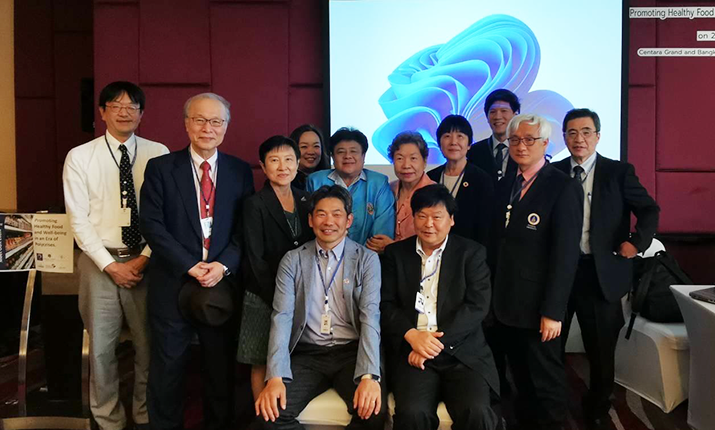Two UIC doctors spoke at the side event of PMAC 2024, the international conference of global health.
January 2024

From January 22 to 27, 2024, the annual Prince Mahidol Award Conference (PMAC), an international conference of global health, was held in Bangkok, Thailand. PMAC is a major international health conference hosted by the Thai Royal Family in honor of Prince Mahidol, who introduced modern medicine to Thailand.
The conference feature discussions on key issues in global health by experts. The theme for 2024 is "Geopolitics, Human Security and Health Equity in an Era of Polycrises.” In addition to the plenary sessions, many side events have also been organized.
Dr. Toshihide Nishimura, a vice chairman of the Umami Information Center (UIC) and Dr. Hisayuki Uneyama, a UIC director, spoke at one of them titled “Promoting Healthy Food and Well-being in an Era of Polycrises” held on January 23.
The event was sponsored by SSBW*, a Thailand and ASEAN based network of researchers and companies on sensory science**
*SSBW:Network for Sensory Science for Better Well-being. The purpose of this network is to improve the wellbeing of human society by sharing the latest findings on sensory science to create a healthy and sustainable food environment.
**sensory science: a scientific field that studies how we perceive the world outside our bodies through the five senses (sight, hearing, smell, taste, and touch) and how the information we perceive affects our preferences and emotions.
In this side event, research on umami and the flavor and koku, the impact of the polycrisis on food security within the food system, and the connection between sensory science and happiness were discussed.
Dr. Toshihide Nishimura had a lecture titled “Effect of Umami Substances on the Enhancement of Palatability and Koku of Food” in Session 1 “Approach from Science and Technology.”
He said that the enjoyment of consuming delicious food is said to contribute to one’s health and wellbeing. It is essential for individuals to consume tasty and healthful food even when working with limited ingredients. In his lecture Dr. Nishimura introduced methods to make limited ingredients enjoyable by utilizing umami substances and enhancing koku perception. He explained in detail the relationship between umami substances and enhancement of koku perception. He stated that taste and aroma play important roles in the perception of flavor and koku when food is consumed.
“Koku" provides "complexity" by incorporating taste, aroma, and texture that forms food characteristics, enhances satisfaction from compounds of taste and aroma below the threshold, and expands the intensity of perception.
Additionally, “Koku" is increased by the persistence of lipids, umami substances, bitterness components, and viscosity, thereby extending the duration of perception. He concluded that the perception of “Koku" in food is an objective element related to flavor, comprising complexity, mouthfulness (richness), and lingeringness, with umami components, lipids, and richness components involved in enhancing the perception of Koku. He talked to the audience that these interrelated factors lead to the value of a rich dietary life, and ultimately, to wellbeing.
Dr. Nishimura also participated in a panel discussion that followed his lecture, where koku was again a subject of great interest to the panelists.
Dr. Hisayuki Uneyama spoke at the input session "Global Survey of Science and Economics on [Food for Wellbeing].” Based on a commentary on a survey on wellbeing conducted by Nature, he stated that food, especially protein and amino acid nutrition, has a significant impact on happy and healthy life. He emphasized that the delicious "taste" of food is particularly important, therefore umami plays a significant role to wellbeing.
Having salt reducing effect, umami deserves further studying. He also explained the Protein Leverage Hypothesis***.
*** Protein Leverage Hypothesis (PLH): This hypothesis suggests that the cause of the global obesity epidemic can be attributed to people's tendency to overconsume fats and carbohydrates due to a strong appetite for protein. According to this hypothesis, the relationship between overconsumption of ultra-processed foods (UPF) and reduced wellbeing can be explained by the dilution of protein and fiber in foods with fat, carbohydrates, and salt.
Dr. Uneyama also participated in the SESSION 2. Approaches from Public Health, Food Industry and Economy, as a chair of the panel discussion.
The event was attended by 70 participants, some of them were standing. There is a close relationship between delicious taste, health, and wellbeing. The audience was reminded that we should make good use of umami substances and the perception of “Koku" in food to get good amounts of protein, vegetables, and other foods that we tend to be deficient in, and to moderate the intake of nutrients such as salt and carbohydrates, which should be avoided in excess.
